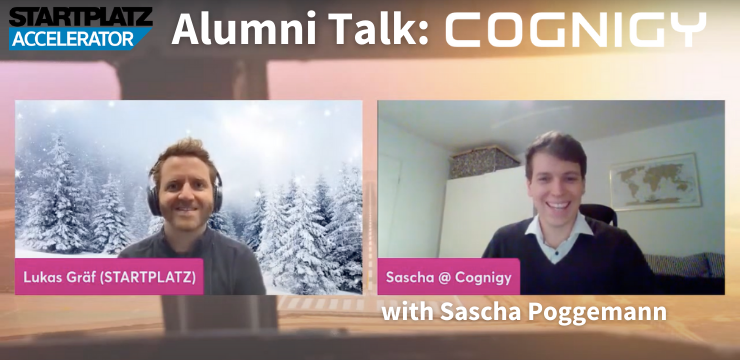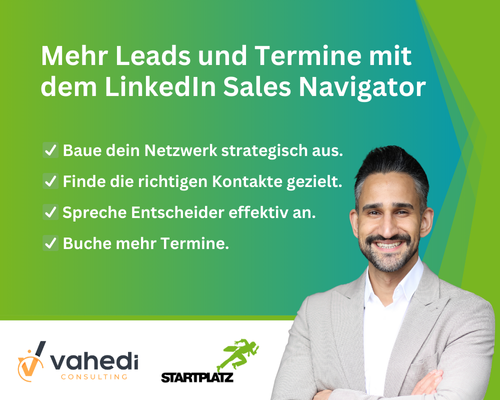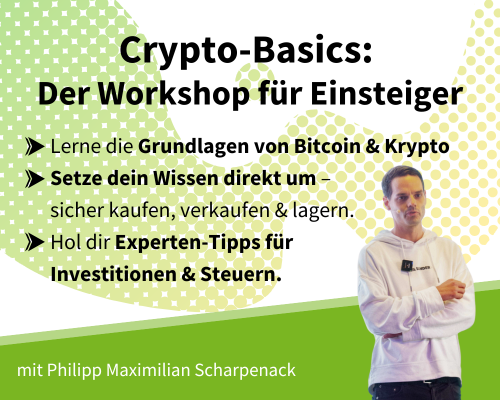- Friday, 02.05.25, 15:00 - 17:00 Uhr
- STARTPLATZ AI Hub Köln, Im Mediapark 5 50670 Köln
- AI Hub Community
Alumni Talk with Cognigy: Interview with Founder Sascha Poggemann
4. Januar 2022, 09:53 :: Accelerator | Allgemein | Community | Success Story
Autor: Rebecca Hunold
Two weeks ago at the STARTPLATZ Accelerator Demo Day of Batch #24 we were happy to welcome Sascha Poggemann, founder of Cognigy. Cognigy is a very successful startup that was part of our Accelerator Batch #11 in 2016 and develops Cognigy.AI, an Enterprise Conversational AI Technology for customer & employee support process automation.
In this interview, Sascha tells us about how the whole journey with Cognigy started and what problems they had on the way, how they manage their fast-growing team. Plus, he gives advice to startups in their early stage, especially regarding raising an important investment round, and talks about what it means to be an international startup with its headquarter in Rhineland.
Cognigy was founded in 2016 in Dusseldorf by Philipp Heltewig und Sascha Poggemann. Since then, the company has gone from strength to strength. Meanwhile, Cognigy’s worldwide client portfolio includes Daimler, Bosch, Lufthansa, Salzburg AG, and many more. At the beginning of June, Cognigy announced a 44 million US dollar venture capital financing, with which the founders want to further accelerate international expansion. With a growth rate of 987.45 percent, Cognigy claims a spot in the top 10 of the Deloitte Technology Fast 50 2021. Sascha gives us insights into the journey of this Dusseldorf flagship start-up.
Lukas Gräf (STARTPLATZ):
Sascha, when I recall correctly, when you were at STARTPLATZ, you were a couple of employees only. And now when I last checked your LinkedIn page you were in triple digits – over 100 employees. That’s awesome. First of all: Congratulations to the big growth, but maybe you can start off by sharing who you are and what you do at Cognigy.
Sascha Poggemann (Cognigy):
[…] We are a leading enterprise software company for a conversational AI. We automate customer service with voice and chat bots and have created an enterprise software technology that we ship around the globe to leading enterprises who want to automate customer service applications.
Lukas Gräf (STARTPLATZ):
How did you get into all of this? I mean, probably not a regular topic to start off.
Sascha Poggemann (Cognigy):
Well, actually, I do have a background in the smart home space. I built one of the German leading smart home platforms before and during that journey. I had early exposure to conversational interfaces like Alexa, Google Home and stuff like that. And so I thought, that’s definitely worth exploring more. And so I teamed up with my co-founder Philip, and later on, Benny, our third co-founder, had joined that journey in order to explore conversational interfaces much more in detail. And that’s what we did.
We got into the accelerator batch. We had two desks in a shared office space at STARTPLATZ – actually in Dusseldorf, not in Cologne, sorry for that. But yeah, that’s where everything got started. We got creative there. And then we hired our first employees, got a dedicated office, and then moved down to another office because we had outgrown that. And when that one was full of people we went further down the road to Speditionsstraße 1, where now our headquarter is based. And from there we took it international, we have dedicated teams and in the US, in Australia, in UK, Tech Dev Center in Spain, and we are a true global enterprise, further expanding into global markets this year and next year.
Lukas Gräf (STARTPLATZ):
All right, super international team. With the pandemic now: How do you manage such a big team? 100+ employees and you’ve also been growing rather quickly. Any insights there?
Sascha Poggemann (Cognigy):
Well, definitely it’s a challenge and putting everyone into home office while we had a very vibrant culture in our office, a collaborative space where a lot of energy has happened, and then we have to move all into Home Office. But we really got adjusted to that. And we are trying to compensate a little bit for that with additional team events that we do and culture sessions and stuff like that. We do have a very diverse group of people – twenty four, twenty five nationalities alone among our teams. So really a true global team with a multitude of different backgrounds. And yeah, we are we are setting ourselves up for remote work. And now these days even explore with virtual reality meetings and whatnot so that the collaboration this is coming back under these restrictions that we have seen right now.
Lukas Gräf (STARTPLATZ):
Maybe let’s jump back a bit in time. And I think, also for the startups pitching today, most of the challenges in the seed stage are pretty big. Maybe you can share some things that you wish you had known when you still starting up small. Not many make it to the stage that you are in now – what can you tell those founders?
Sascha Poggemann (Cognigy):
I think the good news is that everyone that’s here has already started that journey and I think too few actually do have the guts to do that. Being a startup founder is not easy, at least not all the time – it’s fun at some points, but it’s hard work on the other hand. I think we need to encourage more people starting that journey, first of all. But then when you do, you might not get along with five days a week, eight hours a day work week. You might need to put in more working hours, or you need to work through things that you don’t like to do. And I think that the most important thing is make your plan, stick to the plan and just rock and roll and shift everything away that you think is not relevant right now in order to to move forward and move quickly as you can, and explore whether that idea that you’re working on or this hypothesis that you are aiming for, whether they are true and whether they are working and if not, adjust or fail – fail fast – and try again and don’t get discouraged when things are not going as expected. That’s just usual.

Lukas Gräf (STARTPLATZ):
Were there any kind of small fuck ups or problems on your journey that you want to share?
Sascha Poggemann (Cognigy):
[…] I think the biggest thing that we are seeing right now is that we need to create more collaboration within the team. It’s very important because I have colleagues that I’ve never spoken really to, spoken in terms of like – yes, we are having our stand up meetings where everyone sees us as management presenting – but it’s different than speaking next to the coffee machine or flying somewhere into the world and then having a nice evening together, having a nice dinner or something like that. And I think that is something that we really need to compensate for right now. Other than that, a lot of things have gone really well for us. […] But yes, things go wrong. You lose deals that you have been working on for almost a year and you’re like „Oh Gosh, why didn’t I win that?“. But it’s just natural that you don’t. And you always place a certain amount of bets and see which ones of those are coming true. And if the majority of them is, you’re making good progress, and that’s what’s really important: to keep on going and keep on staying focused.
Lukas Gräf (STARTPLATZ):
Maybe one question regarding you. You started out of Dusseldorf. What was that like? Was that an advantage, a disadvantage? What was the journey there?
Sascha Poggemann (Cognigy):
Well, we love the Rhineland and Dusseldorf in particular. There’s a lot of really good talent out here. We are able to attract people to move to Dusseldorf or Rhineland area, so that’s really great. I think one core thing is that we were able to retain a lot of talent in particular and in the tech space and the development teams, and with that consistency, create the product that we have created. That’s very important. In other cities, you might face much more competition and people changing roles and jobs much more frequent, which to some degree, is natural and good that that happens but it should not happen too often and too much, and in particular, not in the development team. And I think that is a real advantage here in this area. Furthermore, there’s a lot of large enterprises around us, so we don’t have to travel too far in order to meet our customers. […] Now expanding, of course, internationally but then we have dedicated teams sitting around as well.

Lukas Gräf (STARTPLATZ):
That’s great to see that you still stay with the headquarter in the Rhineland and building the company here.
Sascha Poggemann (Cognigy):
For us it was very important to choose Dusseldorf, to choose the Rhineland. We didn’t want to build a startup company in Berlin or something like that. But early on, we got into the DNA and into the culture of our company a true global mindset. […] And that’s why we also very early on in 2017 opened up our U.S. office because we said: „OK, we are based in Dusseldorf, but we are acting global and we are thinking global.“ And I think that is something that is very important. Also when it now comes to later stages and you have to have very ambitious goals – think big, think huge, maybe think crazy because our German DNA and our German mindset kind of prevents us from doing that, and it’s super important to set very ambitious goals and go after them if you want to compete in an international market because others will. And we somehow have to be a little crazy about ideas and then execute towards them. Not everything we will achieve, but we achieve at least 80 percent, and that is much more than if we had just set a very low bar goal compared to if we defined some stretch goals.

Lukas Gräf (STARTPLATZ):
It’s also important that we have these role models like you guys in the area here that inspire and motivate the young startups to go the same way. And maybe that leads to my last question: You recently raised a pretty substantial Series B round from Inside, and obviously not many startups in the area do that. So maybe you can share some learnings from raising such a big B round and what it means for you.
Sascha Poggemann (Cognigy):
First of all: fundraising is a lot of work, right? So take that serious. Don’t think a round is going to close in just two months or something like that. That barely happens. It’s hard work. […] Of course, when you grow, that becomes a little easier because your first investors make introductions to other investors. And that was the same case here – how we got introduced to Inside and the other options that we had on the table that wanted to invest in into our company.
The important thing is to really do your due diligence on the investors as well. […] You are setting fundamentals at the early stage with the investors that you’re letting in, with the people that you’re letting into your cap table. And the largest stage or later stage investors are looking at your cap table and see „Oh, how diluted is this? How fragmented is this? What are the terms and conditions of other investors?“ etc. So one thing is very important there: keep the cap table as clean as possible, while at the same time also have the right people in place. What I mean with that is choose carefully whether you are letting a strategic investor in, for example, that has other interests than just financial interests, that might want to influence your strategy etc., that at a later stage, you can’t get out.
Be also careful around or consider pretty much: Is your company really a VC case? Are you having a scalable, sellable product that is that is benefiting from additional VC money? Not every company is – a consulting business that’s difficult for investors to invest in because it doesn’t scale with just the money and only scales by headcount. So that, I think, is very important.
And then what we think is another very critical component is, what we set up for employees as well, is a virtual stock option plan. So our employees are not on our cap table and not directly invested into the GmbH, but participate in the growth of the company with a virtual stock option plan and program, that we have the opportunity to enroll people into as they are progressing with their career at Cognigy. Because for us, that’s very important. We want to have our employees participate in the growth of the company and should there be some point in time an exit event, whatever that might be, then it shouldn’t be only us investors or founders to cash out, but also the employees participating in the growth of the company.
Lukas Gräf (STARTPLATZ):
Very good point. Also very useful for the whole ecosystem itself.
Sascha Poggemann (Cognigy):
It’s not an easy thing to to implement and set up a virtual option program because there are some restrictions in Germany and things you have to consider. But we worked through that with our lawyers and to have come to a very good program for all employees as well. So it’s possible.
Lukas Gräf (STARTPLATZ):
Maybe also now with our new government, we get even better regulations for startups. Sascha, it was great having you here. Thank you so much for dropping in and sharing your story. And, of course, all the best for the future. We are looking forward to following you on your next steps becoming a global game changer. Wish you all the best!
Sascha Poggemann (Cognigy):
Thanks for having me. And very excited to see some of the pitches.
Kommende Events
- Tuesday, 06.05.25, 17:00 - 18:30 Uhr
- Remote,
- Hessam Vahedi
- Wednesday, 07.05.25, 09:00 - 16:00 Uhr
- STARTPLATZ, Im Mediapark 5, 50670 Köln













